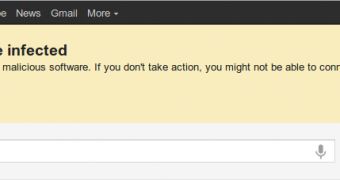Some 300,000 people may discover that their internet connection has stopped working sometime today. Those people were all infected with the DNSChanger trojan at some point and may still be infected now.
As the name of the trojan implies, it messed with the DNS settings on computers, bypassing the default DNS' set up by the ISP and providing custom servers, which the attackers controlled.
The criminal ring behind the attack has been arrested, for the most part. What's more, out of the four million computers that were infected at the peak of the "outbreak," only a few hundreds of thousands are still affected, so the clean-up operation has been a success.
But that's of little use to those still affected by the trojan. Once again, many of the computers that will go dark today may not carry the malicious software anymore, but may still have the altered DNS settings.
In order to allow the people affected time to fix their computers, the FBI has been keeping up the DNS servers pointed at by the malware. But those servers are going down today leaving computers with no way of accessing the internet.
But those still affected really have no one but themselves to blame, first and foremost for getting the trojan in the first place. Google and Facebook have been running informative campaigns, notifying the people still affected that their computer may have a problem. Users were directed to places where they could get help.
Yet, even so, many did not take the necessary steps to fix the issues. They'll have to today though, once their internet stops working. Granted, this is going to lead to a lot of grumbling kids, cousins or neighbors fixing the computers of those that don't know better.
If you're suspecting that your computer is affected, you can find out for sure here. If you are affected and don't know what to do, there are some tools that can help you. Alternatively, you'll have to change the DNS settings on your computer, which is not as scary as it sounds.

 14 DAY TRIAL //
14 DAY TRIAL //